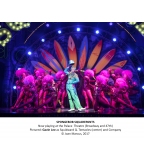Mary Shelley's Frankenstein
By Joseph Cervelli
Just this past August playwright and founder of the Ensemble for the Romantic Century, Eve Wolf gave us the fascinating although rambling “Van Gogh’s Ear.” While beautiful to look it never made much of an impact on my senses. She is back with “Mary Shelley’s Frankenstein” at the Pershing Square Signature Center. As with the previous production this one incorporates classical musical along with the mezzo soprano Krusty Swann whose gorgeous voice is one of the saving graces of another disjunctive written work which is less interesting than the playwright's previous one.
Besides the heavenly Swann and compositions by Bach, Liszt and Schubert among others played with utmost talent by Kemp Jernigan (oboe); Steven Lin (piano) and Parker Ramsay (organ and harpsichord) there is the brilliant dancer Robert Fairchild who was with the New York City Ballet. Broadway audiences were lucky enough to have seen him in the glowing “An American in Paris” in which this terrific performer danced, acted and sang. Here he is this show’s major asset both as actor and choreographer but even he cannot save the mess of a script and having to act with three sluggish performers.
We first see him amidst the excellent set design by Vanessa James and the even more astounding projections by David Bengali writhing in pain as electric currents (stunningly lit by Beverly Emmons) are running through his body as he portrays the Monster created by Dr. Frankenstein (Paul Wesley). Wesley also plays the part of Percy Shelley along with another character. The problem is that he gives such a flat performance that it makes little difference which part he is playing for they all appear intertwined. He may be speaking such lines in describing his feelings in creating the Monster as “breathless horror and disgust filled my heart” as if he were reciting a shopping list.
Worse yet is the completely emotionless and monotonous performance of Mia Vallet who portrays Mary Shelley. Her delivery is equally done in a sedative like feel. And not far behind is the usually good Rocco Sisto who portrays two characters one being a blind man with equally dull rendition.
So much of the storyline is staged by Donald T. Sanders with little sense of a coherence. First, the Monster appears to be normal then without any type of explanation he turns into a dangerous and killing creature.
Fortunately, there is incomparable dancing by Fairchild who blazes with adrenaline that gives the tentative spark that this show badly needs. I could have done without showing the murder of one of the three young boy characters at the end of the first act and his pulling the dead child across part of the stage at the beginning of the second act. One of the most displeasing and unnecessary scenes I have witnessed in recent memory.
Fairchild’s acting is done with sincerity and he convinces as the Monster but sadly he has no one to play off of.
You long for his dance moments and the thrilling Swann along with the musicians but have to deal with not only the pain of listening to dialogue delivered by three performers devoid of any conviction along with desultory writing and equally meandering direction.
Tickets are available at the Pershing Square Signature Centre 480 West 42nd Street or by calling 212.279.4200.
PHOTO CREDITS: SHIRIN TINATI






















